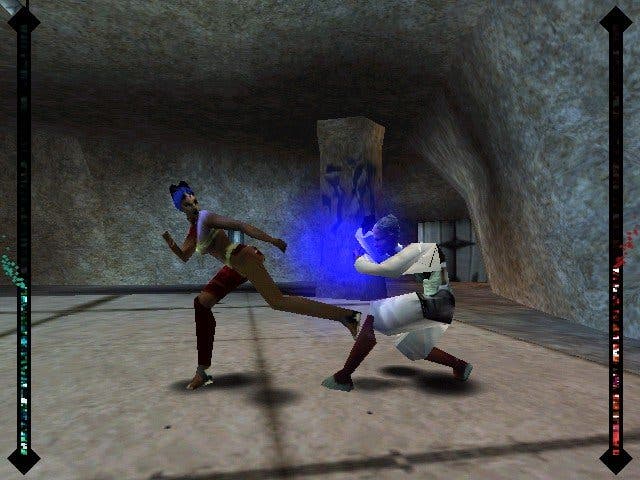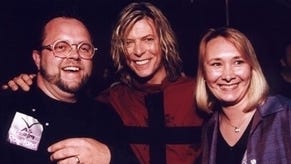Retrospective: Omikron: The Nomad Soul
One for the dreamers.
Much as the Dreamcast port fails to recognise the system it's being played on, the European renaming of the game is not reflected within. Which rather begs the question, why was the game renamed for Europe? Called Omikron: The Nomad Soul in the US, this naturally abbreviates to the first word. And indeed this is how the game names itself from within. Which is a little confusing when the Euro version drops that word entirely. So poor Mr Brecht isn't being well reflected here, now I'm playing a game with a different name on a console it doesn't know about.
But those ideas! You begin playing as cop Kay'l 669 (note: "begin"), who is a person in a city, with an apartment, wife, friends. Confused about what's going on, you migrate toward Kay'l's home to regroup. Here you can use the toilet, practise your combat skills, root through kitchen cabinets, and have a Very Special Cuddle with your wife. David Cage likes apartments.
The city itself is open and explorable, a third-person view of your character with the option to switch to first-person to have a better look around. In what's ostensibly an adventure game, such freedom to explore is remarkable. I think this was best highlighted at a point when I needed a certain drink for a certain task, and discovered that I'd accidentally drunk it earlier. Accidentally because the inventory system is so peculiar, but resolvable by visiting a local supermarket to replace it. It was a wow moment - I need this tea, there's a city with shops - I'll likely be able to find some.

Oh, and if you die, then you die. Often the next human who touches that corpse becomes your character. Which is a fairly astonishing thing. Should Kay'l fall in one of his early fights with a demon upon a rooftop you'll now be playing the next stage of the game as a female thief. You're the Nomad Soul, remember, playing a game, attempting to thwart the efforts of the demons by uncovering their actions with the help of underground sect The Awakened. The body you use isn't the most important thing about you. Then later in the game changing body becomes key to solving puzzles. Don't get attached.
Before this all falls apart completely, I'm going to celebrate one other detail. Then Bowie - I've not forgotten.
Much of the game involves solving mysteries by finding clues, codes, messages and communications. By really quite elaborate means you can break into places to procure secret documents. (One early puzzle can be solved by either drugging your boss's tea and then stealing her pass, or - and here "or" should be written in 60-foot high letters made of flashing bulbs - hacking into the police force's giant mechanised robots after giving booze to a mechanic so you can steal the necessary hardware and implant it in a robot's eye then stealing a fuse from a machine and convincing a computer engineer to leave to fix it and then controlling the mech on a third- and first-person mission fighting a couple of dozen other mechs, in order to open a door.)
Often these messages are written in a font that I think may actually be magic. At first glance it looks like alien gobbledegook, and then as you stare it slowly swims into a legible form. Creating this lettering alone is a masterpiece.
Bowie. 1999's album Hours (which I've listened to throughout playing the game, alternating with 97's Earthling, and then occasionally disappearing back into the seventies) contains songs written for/alongside the game, including closing track The Dreamers - the name of the band he sings for in Omikron. (In fact, dig out the Digital Deluxe version of Hours and the bonus album comes with the original Omikron mixes of Thursday's Child, New Angels of Promise and The Dreamers.)


